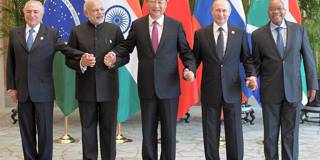The BRICS have lately been going through a rough time, causing many to doubt that some members – namely, Russia and Brazil – even belong in the club of "major emerging economies." The skeptics are wrong.
MANCHESTER – This year’s meeting of the BRICS in India is taking place just a fortnight after the 15th anniversary of the creation of the term “BRICs,” which I coined to refer to the major emerging economies: Brazil, Russia, India, and China (South Africa was added in 2010). Recently, my brief tenure in the British government came to an end, following the completion of an independent review on antimicrobial resistance (AMR) that I had been chairing. As I ponder what to do next, and as the BRICS leaders meet, I can’t help but wonder about the term’s meaning today. Have these large and promising emerging economies fulfilled expectations?
Perhaps the simplest way to answer this question relates to my work on the AMR review, which was launched by former British Prime Minister David Cameron in 2014. On September 21, we achieved a major victory: a high-level agreement by the United Nations on the topic.
After the agreement was reached, a German television crew that had occasionally followed my team and me as we worked to spread awareness of AMR asked me, on air, whether the outcome was more important than the BRIC concept. Without even waiting for me to answer, they declared that it obviously was. And they were right: no economy, emerging or otherwise, can hope to be successful if it is plagued by a health threat as serious and uncontrollable as AMR.

MANCHESTER – This year’s meeting of the BRICS in India is taking place just a fortnight after the 15th anniversary of the creation of the term “BRICs,” which I coined to refer to the major emerging economies: Brazil, Russia, India, and China (South Africa was added in 2010). Recently, my brief tenure in the British government came to an end, following the completion of an independent review on antimicrobial resistance (AMR) that I had been chairing. As I ponder what to do next, and as the BRICS leaders meet, I can’t help but wonder about the term’s meaning today. Have these large and promising emerging economies fulfilled expectations?
Perhaps the simplest way to answer this question relates to my work on the AMR review, which was launched by former British Prime Minister David Cameron in 2014. On September 21, we achieved a major victory: a high-level agreement by the United Nations on the topic.
After the agreement was reached, a German television crew that had occasionally followed my team and me as we worked to spread awareness of AMR asked me, on air, whether the outcome was more important than the BRIC concept. Without even waiting for me to answer, they declared that it obviously was. And they were right: no economy, emerging or otherwise, can hope to be successful if it is plagued by a health threat as serious and uncontrollable as AMR.